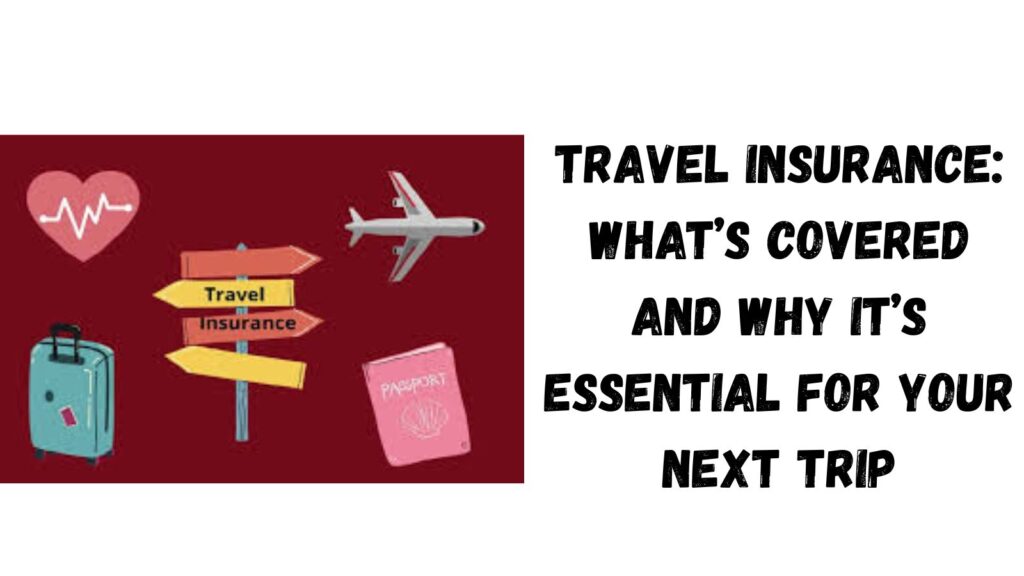Traveling abroad can be an exciting and enriching experience. Travel lets you escape daily life. You can explore new cities, relax on a beach, or dive into a cultural adventure. Each experience helps you create lasting memories. However, as exciting as travel can be, it comes with its own set of risks and uncertainties. From unexpected illnesses to lost luggage, many things can go wrong while you’re far from home.
This is where travel insurance comes into play. Travel insurance might seem like an extra cost, but it protects your finances. It also gives you peace of mind. You’ll be covered if unexpected problems arise during your trip. In fact, in today’s world, having travel insurance is more important than ever. No matter if you’re traveling for business or fun, good travel insurance can really help in unexpected situations.

In this guide, we will explore what travel insurance covers, why it’s essential for your next trip, and provide tips on how to choose the right policy. We’ll also share real-world examples and interesting facts to highlight the value of travel insurance.
What Does Travel Insurance Cover?
Contents
- 1 What Does Travel Insurance Cover?
- 2 How to Choose the Right Travel Insurance Policy
- 3 Fun Fact: Travel Insurance and the Global Pandemic
- 4 Conclusion: Is Travel Insurance Worth It?
- 5 FAQs
- 6 What types of travel insurance should I consider?
- 7 Does my health insurance cover me abroad?
- 8 Can I cancel my travel insurance?
- 9 Is travel insurance worth it for short trips?
- 10 What’s the best time to buy travel insurance?
Travel insurance can cover a wide range of situations, but not all policies are the same. Understanding the types of coverage is key. This way, you can choose the right policy for your travel needs. Here’s a breakdown of the most common types of coverage included in travel insurance:
1. Trip Cancellation/Interruption Coverage
- What it covers: Trip cancellation and interruption insurance helps if you cancel your trip before you leave. It also covers you if you cut your trip short for an unexpected reason. It reimburses non-refundable costs like airfare, hotel bookings, and tours. Common reasons for trip cancellations or interruptions include illness, injury, or unexpected emergencies.
- Real-Time Example: Sarah had planned a dream vacation to Paris with her family, but two days before departure, her father fell seriously ill. Thanks to trip cancellation insurance, she got back the cost of her non-refundable hotel and flight tickets. This saved her thousands of dollars.
- Why it matters: If you travel without trip cancellation coverage, unexpected problems could cost you a lot of money. If you’ve ever had to cancel or reschedule flights or accommodations last-minute, you know how costly it can be.
2. Medical Emergencies Coverage
- What it covers: If you get sick or hurt while traveling abroad, medical emergencies coverage helps with medical bills, hospital stays, surgeries, and sometimes evacuations from remote areas. Having insurance is crucial when you travel to places with high healthcare costs or weak public health systems.
- Real-Time Example: In 2019, David, an American tourist, broke his leg while hiking in the Swiss Alps. His travel insurance paid for his medical treatment and arranged his evacuation to the U.S. Without it, his care would have cost more than $30,000.
- Why it’s important: Many standard health insurance plans don’t cover you abroad. Medical bills abroad can be very high. Travel insurance helps protect you from surprise health emergencies.
3. Lost or Delayed Luggage Coverage
- What it covers: If your luggage gets lost, delayed, or damaged, lost luggage coverage will reimburse you for lost items. It also gives you money to buy essentials like clothes and toiletries. This coverage can be especially helpful when you’re far from home and need immediate assistance.
- Real-Time Example: While traveling to Tokyo, John’s luggage was delayed for three days due to a mix-up by the airline. His travel insurance gave him compensation for the trouble. This included money back for clothing and toiletries while he waited.
- Why it’s important: Luggage mishaps happen more often than you might think. The 2020 SITA Baggage IT Insights report states that around 24 million bags were mishandled globally in 2019. Travel insurance can help mitigate the inconvenience and expenses caused by lost luggage.
4. Flight Delays and Cancellations Coverage
- What it covers: This coverage reimburses you for extra expenses incurred due to a flight delay or cancellation. This can include additional hotel stays, meals, and transport. It’s especially valuable if your delay results in missing an important connection or travel date.
- Real-Time Example: In 2021, Emma’s flight to Greece was delayed by 24 hours due to a weather-related issue. Since she had purchased travel insurance, she was reimbursed for the hotel stay and meals, which would have cost her $500 out-of-pocket.
- Why it’s important: Flight delays and cancellations happen due to a variety of reasons, such as weather, mechanical issues, or strikes. Having travel insurance ensures you aren’t left with unexpected costs when these issues arise.
5. Baggage Theft or Loss Coverage
- What it covers: If your baggage is stolen or lost for good, travel insurance can reimburse you for the stolen items. It can also help with emergency replacement items you need to buy. It provides protection for valuable items such as electronics, jewelry, and documents.
- Real-Time Example: Sarah, on a backpacking trip in South America, had her backpack stolen from a hostel. Travel insurance helped her get back money for her stolen camera, laptop, and other items. This saved her from a big financial loss.
- Why it’s important: Theft is a common issue, particularly in crowded tourist spots. Travel insurance ensures that you don’t have to bear the brunt of financial losses if your belongings are stolen.
6. Emergency Evacuation Coverage
- What it covers: Emergency evacuation insurance helps pay for your escape during natural disasters, political unrest, or serious illness or injury far from help. This coverage may also include transportation to the nearest hospital or the cost of repatriation to your home country.
- Why it’s important: Many travelers don’t think about evacuation insurance, but it can be a lifesaver in emergencies. Without this coverage, evacuation costs can be astronomical. For example, the cost of being airlifted out of a remote location could run into the tens of thousands of dollars.
How to Choose the Right Travel Insurance Policy
When selecting travel insurance, it’s crucial to understand your needs and choose a policy that fits the type of trip you’re taking. Here’s how to make the right choice:
1. Assess Your Trip’s Risks
- Are you traveling to a country with high healthcare costs?
- Are there certain activities, such as hiking or skiing, that increase the risk of injury?
- Will you need to cancel the trip due to unforeseen events like illness or family emergencies?
2. Consider the Duration and Destination
- Longer trips or travel to remote locations may require more extensive coverage. If you’re traveling to a region with a high risk of natural disasters or civil unrest, ensure your policy includes emergency evacuation.
3. Compare Policies and Read the Fine Print
- Compare different providers and plans to find the best coverage for your needs. Be sure to read the exclusions and limitations to avoid surprises when filing a claim.
4. Check for Pre-Existing Condition Coverage
- Some policies cover pre-existing medical conditions, while others don’t. If you have a chronic illness, it’s essential to find a policy that offers this coverage.
5. Consider Additional Coverage for Activities
- If you plan on engaging in specific activities like scuba diving, skiing, or extreme sports, check that your policy covers them. Some standard travel insurance plans exclude high-risk activities.
Fun Fact: Travel Insurance and the Global Pandemic
The COVID-19 pandemic has significantly impacted the importance of travel insurance. The 2021 Allianz Global Assistance report found that 30% of travelers are now more likely to buy travel insurance after the pandemic. Travel insurance now often covers trip cancellations. This includes cancellations due to illness, quarantine rules, and COVID-19 medical emergencies. This is a big change in travel insurance. It shows that more people see how important it is.
Conclusion: Is Travel Insurance Worth It?
Travel insurance might feel like an added cost, but it’s a smart investment. This is especially true for international trips. Travel insurance gives you financial protection and peace of mind. With the right coverage, if something goes wrong, you won’t end up with an empty wallet or a ruined vacation.
Travel insurance covers many situations. It can help with medical emergencies, trip cancellations, flight delays, and lost luggage. Know your needs, pick the right policy, and check what’s covered. This way, you can enjoy your trip with confidence. You’ll be ready for any surprises that come your way.
Is Pet Insurance Worth It? A Complete Guide to Protecting Your Furry Friend
FAQs
What types of travel insurance should I consider?
The most common types include trip cancellation, medical emergencies, baggage loss, and flight delay coverage. For active travelers, look for additional coverage for activities like skiing or scuba diving.
Does my health insurance cover me abroad?
Many standard health insurance policies do not cover medical expenses abroad. Travel insurance usually covers emergency medical care. This is crucial when you travel abroad.
Can I cancel my travel insurance?
Yes, many travel insurance policies allow you to cancel within a set period, usually 10–14 days, to receive a full refund. After that, you may not be eligible for a refund, depending on the policy terms.
Is travel insurance worth it for short trips?
Yes, travel insurance can protect you financially, even on short trips. It covers unexpected events like cancellations or emergencies. It’s often more affordable for short trips and can still offer valuable coverage.
What’s the best time to buy travel insurance?
It’s best to buy travel insurance as soon as you make your trip reservation. This ensures you’re covered for trip cancellations or interruptions before your travel date.


